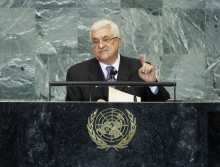Egypt’s emergence as a potential mediator between Israel and the Palestinians for peace talks continued on Wednesday, as Egyptian Foreign Minister Sameh Shoukry visited the Palestinian leadership to discuss international efforts to get negotiations restarted. Ahram Online, citing a report from official Egyptian state media MENA, noted that Shoukry briefed Palestinian President Mahmoud Abbas on the international meeting in Paris – part of the so called “French Initiative” to discuss the situation.
In a parallel report by the Palestinian Ma’an News Agency on the meeting between Shoukry and Abbas, the report noted that Egypt is interested in setting up direct talks between the Palestinians and Israel. Abbas has thus far refused to resume direct talks with Israel, while Israel has repeatedly made the offer to restart them right away.
The Egyptian role in the process has grown after Egyptian President Abdel Fattah al-Sisi issued a speech on the Israel-Palestinian buy valium beijing conflict that was welcomed warmly by Israel. Abbas, according to the official media WAFA cited by the Ma’an, report, told Shoukry of his appreciation of Sisi’s support for the Palestinians.
Egypt’s unique relationship with Israel and the Palestinians has raised the possibility that they could broker talks between the sides. Regardless of how it is done, Israel has long insisted the only effective way to achieve peace is through direct talks, a message Israeli President Reuven Rivlin reiterated to United Nations Secretary-General Ban Ki-moon on Monday.
“There is, I believe, a regional desire to bring an end to the conflict with the Palestinians,” said Rivlin in comments released by his office.
He later referenced the new deal with Turkey, but his comments there could easily be applied to the Palestinian situation. “There are no shortcuts in the Middle East,” said Rivlin. “Hatred spreads much faster than hope, and the only way to move forward is direct negotiations.”
(By Joshua Spurlock, www.themideastupdate.com, June 29, 2016)

